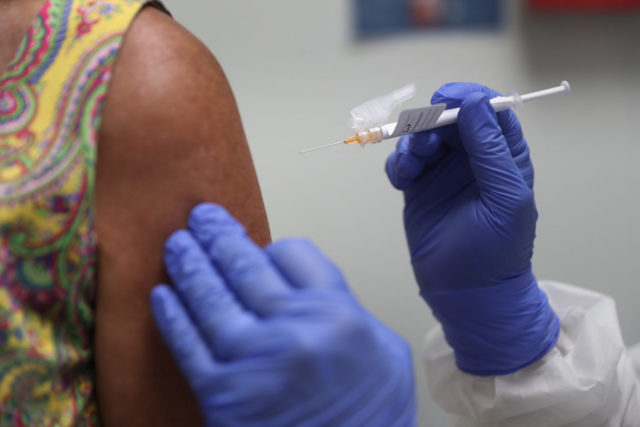(CNN) — Black and Hispanic people in the United States are more likely to catch Covid-19, and they’re more likely to be hospitalized or even die of it. But both groups are still missing out on testing and vaccination in many states, according to new data compiled by Johns Hopkins University and shared exclusively with CNN.
Data from the US Centers for Disease Control and Prevention shows that Black and Hispanic people are at least twice as likely to die of Covid-19 as non-Hispanic White people and nearly three times more likely to be hospitalized. Both Black and Hispanic people are more likely than White people to be infected with Covid-19, too.
But Hispanic people and Black people, with exceptions in a few states, are more heavily represented among those who have been infected with Covid-19 or died of it than they are among those who have been vaccinated, according to the JHU data.
Without the data, authorities can’t know what they need to do to fix disparities that can help the virus spread and prolong the pandemic. With it, problem areas become clear.
Of the 37 states that track cases and vaccinations by ethnicity, Hispanic people represent a smaller share of vaccinations than they do cases in all but four states. And of the 39 states that track by race, Black people represent a smaller share of vaccinations than they do cases in all but six states.
Similar trends can be seen for testing, though only eight states track the share of Covid-19 tests by race and ethnicity along with cases and deaths.
For the past six months or so, JHU has parsed through demographic data on Covid-19 cases, deaths, testing and vaccinations made publicly available by states. A new dashboard, published Tuesday, offers a state-by-state look at the data broken down by age, gender, race and ethnicity.
States do report this information to the CDC, but the resulting datasets are limited by federal reporting requirements, Beth Blauer, executive director and co-founder of the Centers for Civic Impact at JHU, told CNN.
States are able to utilize — and publish — the data they collect beyond these federal regulatory constraints, and the JHU dashboard that attempts to standardize the data states put out offers perhaps the most detailed demographic look at various Covid-19 metrics.
But while JHU’s data showcases the persistent disparities in Covid-19 risk for certain demographic groups, it’s also readily apparent that there is also a persistent lack of available data necessary to track and improve upon those disparities.
Inconsistent data complicates the effort
Compiling this data was “complicated at every turn,” Blauer told CNN. “It’s indicative of a lack of leadership and lack of focus on standardizing data.”
JHU found inconsistencies in the ways that racial and ethnic groups are defined among states, sometimes even across different metrics within the same state’s data.
Also, states have six different ways to tabulate testing — the number of people tested or the number of specimens tested, for example — and six different ways to account for vaccinations, too.
Poor data collection frameworks are present across the country, which is a larger referendum on the public health system in the US, Blauer told CNN. The share of data that has demographic detail attached to it has stayed pretty consistently below 60%.
“It demonstrates that the system itself doesn’t learn,” she said.
Regardless, data collection is a step in the right direction, experts say. “We always say data is what drives action,” Emily Zylla, senior research fellow with the State Health Access Data Assistance Center at University of Minnesota, told CNN.
And once it’s collected and published, the data needs to be tied to specific strategies and interventions to really make change, she said.
Illinois, for example, is one of the few states that tracks both testing and vaccination data by race and ethnicity.
“By collecting demographic data for testing, cases, and deaths, we can see some of these hardest hit areas and deploy more resources — such as educational materials, community health workers, and testing. Similarly, demographic vaccination data helps inform where more targeted efforts are needed,” Melaney Arnold, public information officer with the state health department, told CNN.
“With lower vaccination rates among the African American — Black population, we have reached out to houses of worship and community-based organizations in these communities to set up mobile vaccination clinics, as well as outreach to Black fraternity and sorority organizations to help instill trust in the safety and effectiveness of the vaccines.”
Despite data limitations, trends emerge but aren’t corrected
“The data, even in its limited nature, really confirms that if you are poor and if you are Black or Brown in this country, you are very limited in where you can access basic resources to even navigate personal decisions around Covid,” Blauer told CNN.
“Even when we knew there were major testing access issues we didn’t correct for it in vaccination distribution.”
With one exception in Missouri, each of the states in which Black and Hispanic people are under-tested are also states in which Black and Hispanic people are under-vaccinated relative to their share of Covid-19 cases.
It took a while for the federal government to require states to collect demographic data for tests, Zylla said, and even after it was required, collecting that type of data requires people to share information about themselves and involves a level of trust.
“Getting to that level of data doesn’t happen overnight,” she said.
Technology and resources that allow for thorough record-keeping differ by state, and health departments are stretched thin with other pandemic-related tasks, too.
“Local leaders also frustrated. They’re carrying the burden of having to be front line responders,” JHU’s Blauer told CNN. “There are bright spots at local level, both states and local communities. The question is: ‘Are we going to extrapolate these lessons learned?'”
The-CNN-Wire
™ & © 2021 Cable News Network, Inc., a WarnerMedia Company. All rights reserved.




























